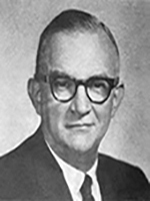Conservatives should return to their roots.
By JIM DIPESO, REP Policy Director
AN HISTORICAL DOCUMENT: This op-ed was published in the Casper (WY) Star-Tribune and the Billings (MT) Gazette on September 2 and 3, 2004.
xx
When President Lyndon Johnson signed into law the Wilderness Act 40 years ago this Friday (Sept. 3), one of the lawmakers at the signing ceremony was Congressman John Saylor, one of the most conservative Republicans to ever walk the Capitol.

GOP Rep. John Saylor was such an ardent advocate for wild land and wild rivers that conservationists of his day called him “Saint John.”
But Saylor, a Pennsylvanian who served in the House from 1949 until his death in 1973, knew that true conservatives value conservation — an ideal that, sadly, many of his political successors have forgotten.
Saylor’s wilderness legacy has not been forgotten. Thanks to the Wilderness Act, the nation has permanently protected 662 areas in 44 states covering nearly 106 million acres of deep forests, ancient mountains, lonely deserts, free-flowing rivers, and boggy marshes.
Protected wilderness areas include spectacular landscapes typically thought of as wilderness — the Teton in Wyoming, Mount Shasta in California, Gates of the Arctic in Alaska. But the Wilderness Act protects more modest but no less precious corners of America — Piney Creek in Missouri, Nordhouse Dunes in Michigan, the Great Swamp in New Jersey.
The Wilderness Act was an achievement of sweeping vision and extraordinary bipartisanship. Lawmakers thought beyond themselves and left a bequest for the future.
A rare feat, especially when seen from today’s politically fractured vantage point.
Remembering Congressman Saylor’s hard fight for the Wilderness Act offers hope that America can leave behind today’s dreary political battles, where the nation’s natural heritage is another football tossed around by bitter partisans.
Saylor fought for wilderness protection because he had good, conservative reasons for doing so.
On the floor of the House in July 1956, Saylor ticked them off:
- Wilderness is needed for national defense. Hardy recreation in wild lands is a toughening experience that will prevent Americans from softening into an “easy-going people deteriorating in luxury and ripening for the hardy conquerors of another century.” Half a century later, with an obesity epidemic afflicting America, Saylor’s argument is as timely as ever.
- Wilderness expands individual freedom by providing a refuge, open to all, that gives respite from the stresses of modern living and a reconnection to the quieter, more measured rhythms of days past.
- Wilderness is a lesson in humility, where “we can keep from getting blinded in our great human success to the fact that we are part of the life of this planet.”
Strengthening America’s defense. Expanding freedom. Seeking the humility that saves fallible mankind from dangerous hubris. Such traditional conservative virtues are seldom employed anymore as arguments for wilderness conservation. America is worse for it.
Since Saylor’s time, political thinking about the environment has fallen into polarized camps.
“Liberal” environmentalists have forgotten how to leave their comfort zones and broaden the constituency for conservation. “Conservative” leaders have trampled their philosophical heritage with specious accusations that environmentalists seek only to curtail liberty and destroy business enterprise.
We can no longer afford such civic dysfunction. Partisan boundaries have no meaning in nature. There are no Republican rivers or Democratic forests.
While angry arguments go round and round, human numbers and technologies are exerting dangerous pressures on natural ecosystems that sustain our existence. The wildlands that shaped our nation’s culture and embody our freedom are being squeezed by pollution, sprawl, and political indifference.
Forty years ago, Congressman Saylor helped build bridges linking conservatives and liberals in a grand cause to protect samples of the original wild America for the nation’s greater good. On this 40th anniversary of the Wilderness Act, we must rediscover Saylor’s wisdom in order to protect America’s conservation legacy for the unborn generations that will follow.
Return to THINGS WE FIGHT FOR: LAND CONSERVATION IN GENERAL
Return to REP’S HISTORY: PART 2
Return to top of page
